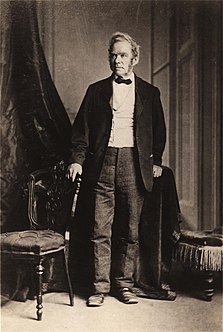This page is based on this
Wikipedia article Text is available under the
CC BY-SA 4.0 license; additional terms may apply.
Images, videos and audio are available under their respective licenses.
The foreign government advisors in Meiji Japan, known in Japanese as oyatoi gaikokujin, were those foreign advisors hired by the Japanese government for their specialized knowledge to assist in the modernization of Japan at the end of the Bakufu and during the Meiji period. The term is sometimes rendered o-yatoi gaikokujin in romaji. The total number is uncertain, but is estimated to have reached more than 3,000. Until 1899, more than 800 hired foreign experts continued to be employed by the government, and many others were employed privately. However, despite being called "experts", some were simply convenient hires who happened to be in the treaty ports such as Yokohama and Kobe.

Josiah Warren was an individualist anarchist, inventor, musician, printer and author in the United States. He is regarded by some as the first American anarchist and the four-page weekly paper he edited during 1833, The Peaceful Revolutionist, the first anarchist periodical published, an enterprise for which he built his own printing press, cast his own type, and made his own printing plates.

The Anthology Club, or Anthology Society (1804–1811) was organized in 1804 in Boston, Massachusetts by the Rev. William Emerson, father of Ralph Waldo Emerson.
Cost the limit of price was a maxim coined by Josiah Warren, indicating a (prescriptive) version of the labor theory of value. Warren maintained that the just compensation for labor could only be an equivalent amount of labor. Thus, profit, rent, and interest were considered unjust economic arrangements. As Samuel Edward Konkin III put it, "the labor theory of value recognizes no distinction between profit and plunder."
Josiah Tattnall Sr. was an American planter, soldier and politician from Savannah, Georgia. He represented Georgia in the U.S. Senate from 1796 to 1799, and was the 25th Governor of Georgia in 1801 and 1802. Born near Savannah, Georgia at Bonaventure Plantation in the early 1760s to Mary Mullryne and Josiah Tattnall, he studied at Eton School before joining Anthony Wayne's troops at Ebenezer during the American Revolutionary War. After the war, he was elected brigadier general of the 1st Regiment in the Georgia Militia. He helped to rescind the Yazoo land fraud of 1795. He died in Nassau, New Providence.
Josiah Hort, was an English clergyman of the Church of Ireland who ended his career as archbishop of Tuam (1742–1751).

Josiah Towyn Jones was a Welsh clergyman and Liberal Party politician. He was Member of Parliament (MP) for Carmarthenshire East and later for Llanelli.
The Christian Observer was a London evangelical periodical, serving a readership in the Church of England. It appeared from 1802 to 1874.
William Josiah Irons (1812–1883) was a priest in the Church of England and a theological writer.
John Kempthorne was an English clergyman and hymnwriter.
This article is about the particular significance of the year 1804 to Wales and its people.

Josiah Butterfield was an early Mormon leader and member of the Presidency of the Seventy of the Church of Jesus Christ of Latter Day Saints.
The Quincy family was a prominent political family in Massachusetts from the mid-17th century through to the early 20th century. It is connected to the Adams family through Abigail Adams.

Josiah Pratt (1768–1844) was an English evangelical clergyman, involved in publications and the administration of missionary work. His son John Henry Pratt became Archdeacon of Calcutta and was famous for his work in geology.





